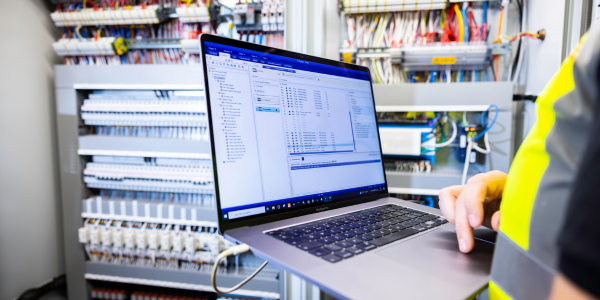Finding and hiring an external provider for Building Management System (BMS) maintenance can be a daunting experience for technical and non-technical building managers alike. In your role, you’re responsible for ensuring the reliability, efficiency and safety of your building’s systems, which means partnering with a trusted and experienced BMS specialist engineer is crucial.
This blog highlights key factors to consider, from verifying credentials and the experience of your chosen engineer to understanding what a typical BMS maintenance checklist includes, and what to expect at the end of the service. By understanding these core elements, non-technical managers, in particular, can make informed decisions, ensuring their BMS remains in top working order.
Tips on selecting your BMS service engineer
A good place to start is by checking your prospective BMS engineer’s certifications and industry experience to ensure they are qualified. Specialists who provide a range of services, including regular inspections, emergency repairs, system upgrades and replacement programmes, will be able to demonstrate a thorough understanding of building management systems. This comprehensive service offering also ensures that all aspects of your BMS is kept in excellent working condition going forwards.
You can gauge their reliability and customer satisfaction by checking independent online reviews and client testimonials. Additionally, you could ask for examples of how they have successfully serviced clients with buildings similar to yours. This ensures they have the expertise to handle any special features your building may possess, such as its size and complexity, rural location, occupancy type and/or historical/grade 2 listings, that may impose specific limitations.
At the same time, assess their responsiveness to your enquiries and ask about their ongoing availability to handle urgent repairs promptly. Seek clarity about pricing and detailed maintenance service agreements to avoid hidden costs and ensure complete transparency.
Before maintenance begins
Maintenance work will typically include an inspection of the BMS to evaluate its performance. However, an experienced BMS engineer will initiate a discussion with you beforehand, based on how your system and your building have been functioning to date.
They’re likely to pose questions such as:
- Have there been any recent upgrades or repairs to the HVAC system?
- Are there any recurring issues with the system?
- Are there any new issues or complaints from staff about the building?
- Have there been any alarms or notifications from the BMS recently?
- Are there any specific areas or zones of your building that need particular attention?
- Are there any upcoming projects or changes that will be made to the building that are likely to impact the BMS?
Having an open exchange about the history and future expectations of your BMS and your building will ensure the BMS service engineer can investigate further.
During inspection
See the BMS maintenance service as a general ‘health check’ for the building in terms of physical features and software performance. The type of checks that are carried out will vary depending on the type of building and BMS. For instance, for larger, more complex buildings that require intricate BMS types, an experienced BMS service engineer will make multiple maintenance service visits throughout the year, focusing on a specific element of the system each time, to guarantee that all elements are assessed in detail.
During the inspection process, the engineer will actively search for failing components of the system, assess the need for firmware updates and security patches, and identify discrepancies between the building’s usage and its control, which often results in energy wastage. The engineer will also create and maintain a software backup of the entire BMS system in secure storage, ensuring that any potential catastrophic system failure can be recovered from effectively.
Last but not least, the inspection will also look at the physical aspects of the BMS and, in particular, the control panels themselves. Any issues should be duly recorded along with suggested remedial actions. The heating, ventilation and air-conditioning (HVAC) plant will also be assessed for signs of wear and tear or performance problems.
Your easy-reference BMS maintenance checklist
The below BMS maintenance checklist can be used to guide Building Managers in collaborating with their chosen BMS engineer and what to expect from a comprehensive maintenance service:
Initial discussion with the BMS engineer:
- Discuss current BMS and building performance.
- Talk about any remedial actions recommended during the last maintenance service.
- For older BMSs reaching their End of Life cycle, discuss an upgrade or replacement programme.
Sensors & Actuators:
- Test and calibrate temperature, humidity, pressure and occupancy sensors.
- Ensure actuators and valves operate correctly and respond to control signals.
Alarm system:
- Verify alarm settings and thresholds.
- Test alarm notification systems for responsiveness.
Software updates:
- Check for available firmware updates and security patches.
- Backup system configurations and databases regularly.
Setpoints and Schedules:
- Evaluate control setpoints and schedules for efficiency.
Communication Networks:
- Check network connections, cables and communication protocols.
- Ensure data logging and remote monitoring functions are operational.
Energy Management:
- Identify opportunities for energy savings through system adjustments.
Control panels:
- Check for physical damage, loose connections or signs of overheating.
- Verify proper labelling and functionality of controls.
HVAC System:
- Assess any issues with the HVAC encountered during BMS testing for signs of wear, leaks or abnormal noises.
- Test heating and cooling performance.
What to expect following maintenance
Once the maintenance service has concluded, your BMS service engineer will provide a comprehensive service report. This document goes beyond a mere checklist, instead detailing the findings and actions taken during the inspection. It should include:
- Detailed assessment: a thorough evaluation of system components, including control panels and HVAC equipment.
- Identified issues: clear documentation of any problems found, such as faulty components, performance discrepancies or potential risks.
- Remedial actions: professional recommendations for corrective measures or repairs, prioritised by urgency and impact.
- Software updates: confirmation of updates implemented and their impact on system performance.
- Future recommendations: suggestions for upgrades to improve system efficiency and reliability.
This report should serve as a valuable tool for really understanding the current state of your BMS, planning future maintenance work in conjunction with our suggested BMS maintenance checklist, and ensuring optimal building performance.
Get in touch
Cube Controls is an established and experienced supplier of Building Management Systems, specialising in the design and set up of bespoke environmental and energy control programmes for commercial buildings and property.
To find out how Cube Controls can support you at all stages of design and consultancy, installation and modification and maintenance of your building management systems contact our expert and friendly team on 01903 694279 or sales@cubecontrols.co.uk.




